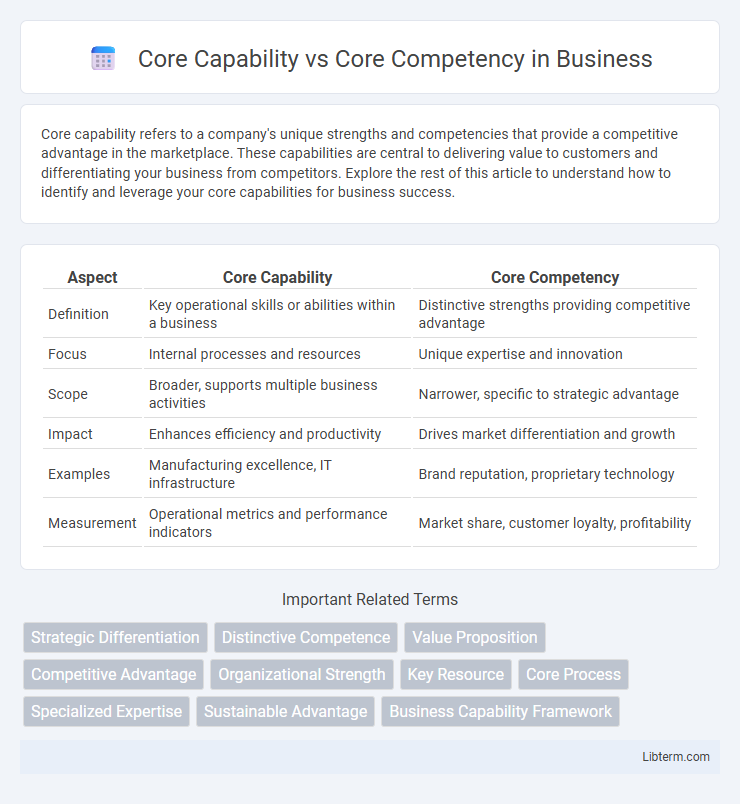Core capability refers to a company's unique strengths and competencies that provide a competitive advantage in the marketplace. These capabilities are central to delivering value to customers and differentiating your business from competitors. Explore the rest of this article to understand how to identify and leverage your core capabilities for business success.
Table of Comparison
| Aspect | Core Capability | Core Competency |
|---|---|---|
| Definition | Key operational skills or abilities within a business | Distinctive strengths providing competitive advantage |
| Focus | Internal processes and resources | Unique expertise and innovation |
| Scope | Broader, supports multiple business activities | Narrower, specific to strategic advantage |
| Impact | Enhances efficiency and productivity | Drives market differentiation and growth |
| Examples | Manufacturing excellence, IT infrastructure | Brand reputation, proprietary technology |
| Measurement | Operational metrics and performance indicators | Market share, customer loyalty, profitability |
Understanding Core Capability and Core Competency
Core capability refers to the unique combination of skills, technologies, and processes that enable an organization to deliver value and maintain competitive advantage in specific areas. Core competency encompasses the collective learning and expertise within an organization that distinguishes it from competitors and satisfies customer needs effectively. Understanding core capability involves recognizing operational strengths, whereas understanding core competency focuses on leveraging specialized knowledge for strategic growth.
Defining Core Capabilities
Core capabilities refer to a company's essential skills, technologies, and resources that enable it to deliver unique value and maintain competitive advantage in the market. These capabilities encompass operational processes, technological expertise, and organizational knowledge critical for sustained performance. Identifying and developing core capabilities helps firms streamline innovation and effectively respond to changing industry demands.
Defining Core Competencies
Core competencies are unique strengths and abilities that provide a company with a competitive advantage, encompassing knowledge, skills, and technologies. They are deeply ingrained capabilities that are difficult for competitors to imitate and directly contribute to customer value and business growth. Defining core competencies requires identifying activities central to creating differentiated products or services that align with long-term strategic goals.
Key Differences Between Capabilities and Competencies
Core capabilities refer to the unique resources and skills a company possesses that enable it to deliver value and achieve competitive advantage, while core competencies are the collective learning and coordination of skills that differentiate the organization in the marketplace. Capabilities emphasize organizational processes and systems, whereas competencies focus on individual and team expertise and knowledge. The key difference lies in capabilities being broader, resource-based strengths and competencies representing specialized skills embedded in people and workflows.
Strategic Importance of Core Capabilities
Core capabilities represent a company's essential technological and organizational skills that enable consistent delivery of value and competitive advantage. These capabilities form the foundation for developing core competencies, which are unique strengths that drive long-term strategic success and market differentiation. Focusing on strategic importance, core capabilities facilitate innovation, operational efficiency, and adaptability, directly impacting sustainable growth and industry leadership.
The Role of Core Competencies in Competitive Advantage
Core competencies are unique strengths and abilities that provide a company with a sustainable competitive advantage by enabling access to a wide variety of markets and delivering substantial customer value. Unlike core capabilities, which refer to the operational skills and processes, core competencies integrate knowledge, technology, and coordinated activities that differentiate a firm from competitors. These competencies foster innovation, brand reputation, and customer loyalty, directly influencing a company's long-term market position and profitability.
Identifying Your Organization’s Core Capabilities
Identifying your organization's core capabilities involves analyzing unique resources, processes, and expertise that provide a competitive advantage and deliver consistent value to customers. Core capabilities are typically embedded in operational functions such as advanced manufacturing, supply chain management, or technological innovation, enabling efficient execution and product differentiation. Differentiating these from core competencies, which emphasize strategic knowledge and skills, helps businesses align their capabilities with long-term goals and market demands.
Building and Developing Core Competencies
Building and developing core competencies involves identifying unique strengths that provide competitive advantage and fostering skills, knowledge, and processes that are difficult for competitors to replicate. Core capabilities are the underlying technical and managerial skills that support these competencies, requiring continuous investment in employee training, innovation, and organizational learning. Strengthening core competencies enables companies to adapt to market changes and deliver superior value to customers.
Core Capabilities vs Core Competencies in Business Success
Core capabilities refer to a company's essential skills and processes that enable efficient operations, while core competencies are unique strengths offering competitive advantage and market differentiation. Successful businesses leverage core competencies to innovate and capture market share, whereas core capabilities ensure consistent performance and operational excellence. Understanding the balance between core capabilities and core competencies drives strategic growth and long-term business success.
Best Practices for Leveraging Core Strengths
Core capabilities refer to a company's unique processes and technologies, while core competencies encompass the collective knowledge and skills that provide competitive advantage. Best practices for leveraging core strengths include identifying these foundational assets, aligning them with business strategy, and continuously investing in their development and integration across departments. Prioritizing core competency refinement enhances innovation, operational efficiency, and sustainable growth.
Core Capability Infographic

 libterm.com
libterm.com